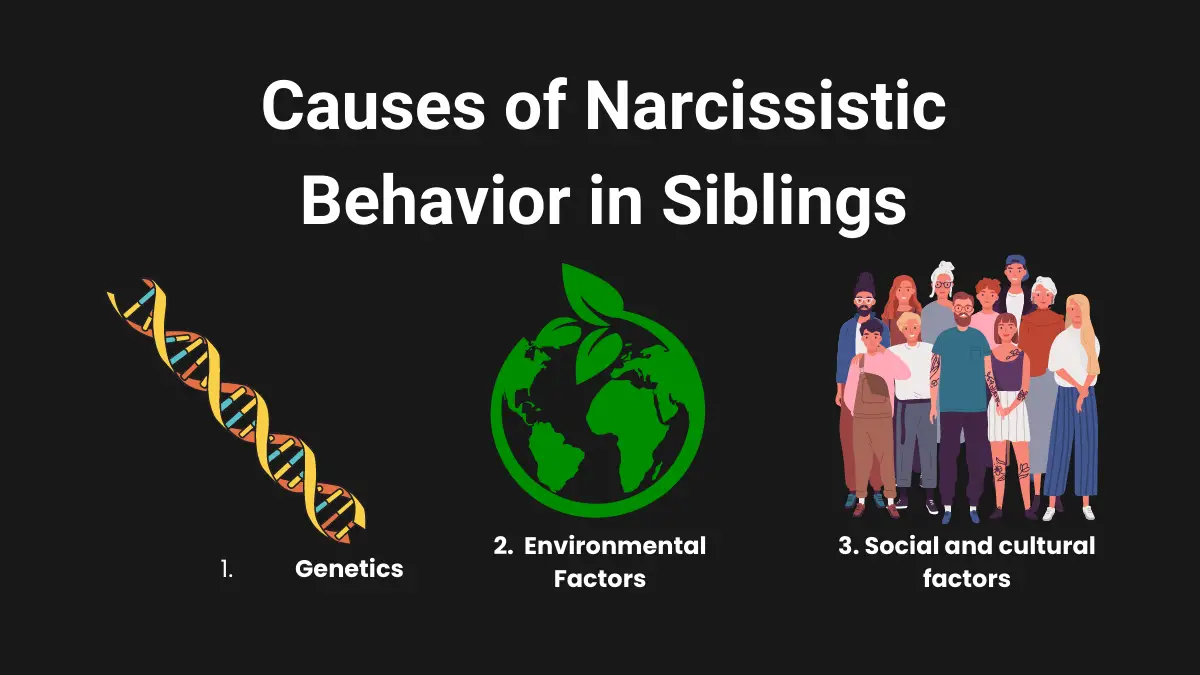Narcissistic sibling relationships can be a source of immense emotional pain and distress for those who experience them. When one sibling displays traits of narcissism, such as an inflated sense of self-importance and a lack of empathy, it can create a toxic dynamic within the family. This can result in the affected individual feeling powerless, invalidated, and dismissed.
In this article, we will explore the concept of narcissistic siblings, examine ten signs of narcissistic siblings to look out for, and provide guidance on how to deal with narcissistic siblings.
By understanding the signs of narcissistic sibling behavior and learning effective coping strategies, individuals can navigate these difficult relationships and find ways to protect their emotional well-being.
What is a Narcissistic Sibling?

A narcissistic sibling is a brother or sister who exhibits symptoms of narcissistic personality disorder (NPD) or Narcissistic traits, a condition characterized by an exaggerated sense of self-importance, a lack of empathy, and an intense need for admiration and attention.
Narcissistic siblings often display selfish and manipulative behavior, placing their own needs and desires above those of their family members.
They may use tactics such as gaslighting, emotional blackmail, and triangulation to maintain control over their siblings and other family members. Narcissistic sibling relationships can be highly damaging and can cause long-term emotional and psychological harm to the affected individuals.
Prevalence of Narcissistic Sibling Relationships
The prevalence of narcissistic sibling relationships is difficult to determine as it is a relatively understudied area. However, research on narcissistic personality disorder suggests that approximately 1% of the general population may have the disorder.
This means that there may be a significant number of individuals with narcissistic traits, including siblings, within families.
Additionally, studies have found that individuals with a narcissistic personality are more likely to have difficulties with interpersonal relationships, including with family members. This suggests that narcissistic sibling relationships may be more common than we currently realize.
Despite the lack of research in this area, it is essential to acknowledge the impact that these relationships can have on individuals and the importance of seeking support and guidance to navigate them.
Understanding the Causes of Narcissistic Behavior in Siblings

Understanding the causes of narcissistic behavior in siblings is complex and multifaceted, and it often involves a combination of genetic, environmental, and social factors.
Research has suggested that genetics may play a role in the development of narcissism, as there appears to be a heritable component to the disorder. However, not all individuals with a genetic predisposition to narcissism will go on to develop the disorder, and environmental factors may also be at play.
Environmental factors that may contribute to the development of narcissism include childhood experiences, such as neglect, abuse, or overindulgence, which may lead to a lack of empathy, entitlement, and a need for admiration.
Sibling relationships may also play a role, particularly if there is a history of sibling rivalry, favoritism, or other dysfunctional dynamics that contribute to a sense of competition or jealousy between siblings.
Social and cultural factors may also play a role in the development of narcissism. In some cultures, individualism and self-promotion are highly valued, which may encourage the development of narcissistic traits.
Social media and the internet may also contribute to the development of narcissistic behavior, as individuals are able to present curated versions of themselves to a wide audience and receive validation through likes, followers, and comments.
Overall, the causes of narcissistic behavior in siblings are complex and multifactorial, and may involve a combination of genetic, environmental, and social factors. Understanding these causes can be helpful in identifying problematic behaviors and developing strategies to manage and cope with them.
Signs of Narcissistic Siblings
Here are ten signs of narcissistic siblings:
- Lack of Empathy: Narcissistic siblings have difficulty understanding and relating to the feelings of others, including their siblings. They may disregard or minimize their sibling’s emotions and experiences, and fail to show genuine empathy.
2. Sense of Entitlement: Narcissistic siblings often have an exaggerated sense of their own importance and feel entitled to special treatment and attention from others, including their siblings.
3. Manipulation Tactics: Narcissistic siblings may use manipulation tactics such as gaslighting, guilt-tripping, and emotional blackmail to control their siblings and get what they want.
4. Need for Attention and Admiration: Narcissistic siblings crave attention and admiration from others, including their siblings. They may demand constant praise and validation and become jealous or resentful when they do not receive it.
5. Competitive Behavior: Narcissistic siblings may engage in competitive behavior with their siblings, always striving to be the center of attention and the best at everything.
6. Superiority Complex: Narcissistic siblings may have an inflated sense of their own abilities and accomplishments and may feel superior to their siblings.
7. Blaming Others for Their Problems: Narcissistic siblings may refuse to take responsibility for their mistakes or shortcomings and instead blame others, including their siblings.
8. Lack of Accountability: Narcissistic siblings may refuse to accept feedback or criticism and may become defensive or aggressive when confronted with their flaws or mistakes.
9. Jealousy and Envy: Narcissistic siblings may become jealous or envious of their siblings’ successes and accomplishments, and may try to undermine or sabotage them.
10. Inability to Handle Criticism: Narcissistic siblings may struggle to handle any criticism or feedback, even if it is constructive or well-intentioned. They may become defensive or hostile when faced with criticism from their siblings or others.
It is important to note that not all narcissistic siblings will display all ten of these signs, and some may exhibit additional or different behaviors. Additionally, the severity and frequency of these behaviors may vary between individuals.
Examples of Narcissistic Sibling
Here are some examples of behaviors that may be exhibited by a narcissistic sibling:
- Dominating conversations and always needing to be the center of attention, even if it means talking over others.
- Belittling or criticizing their siblings, often in front of others, in an attempt to assert their dominance and superiority.
- Engaging in manipulative behavior, such as gaslighting, to control and exploit their siblings.
- Refusing to take responsibility for their actions and instead blaming others for any problems that arise.
- Expecting special treatment and privileges, such as being given the best gifts or always being allowed to choose what to do or where to go.
- Competing with their siblings for attention, validation, or resources, and becoming hostile or resentful if they do not receive what they feel they are entitled to.
- Expecting their siblings to cater to their needs and desires, and becoming angry or upset if they do not receive the attention they feel they deserve.
Impact of Narcissistic Siblings on Family Dynamics

Narcissistic siblings can have a significant impact on family dynamics, often creating a toxic and dysfunctional environment that can be difficult to navigate. Here are some examples of how narcissistic siblings can affect family dynamics:
Sibling Rivalry: Narcissistic siblings may view their siblings as competition for attention, validation, or resources, and engage in constant power struggles and rivalries.
Favoritism: Narcissistic siblings may seek to ingratiate themselves with parents or other family members in order to gain favor or special treatment, leading to feelings of resentment and jealousy among other siblings.
Parental Alienation: Narcissistic siblings may engage in manipulative behavior, such as lying or gaslighting, to turn parents or other family members against their siblings and gain an advantage.
Emotional Manipulation: Narcissistic siblings may use emotional manipulation tactics such as guilt-tripping, blame-shifting, or playing the victim to control and manipulate their siblings.
Disruption of Family Events: Narcissistic siblings may cause disruptions or drama during family events, such as holidays or weddings, by demanding attention, causing conflicts, or creating scenes.
Enabling Behavior: Family members may enable the narcissistic behavior of their sibling by giving in to their demands, catering to their needs, or failing to set appropriate boundaries.
Overall, the impact of narcissistic siblings on family dynamics can be significant and long-lasting. It can create a toxic and dysfunctional environment that can be difficult to navigate and may require intervention to resolve.
Dealing With Narcissistic Sibling
Dealing with narcissistic siblings can be challenging, but there are steps you can take to manage the relationship and protect your own well-being. Here are some tips for dealing with narcissistic siblings:
- Recognize the signs of narcissism: Educate yourself about narcissism and how it manifests in relationships. Look for signs such as a lack of empathy, excessive self-focus, and a need for admiration.
2. Set boundaries: Establish clear boundaries and communicate them to your sibling. Let them know what behaviors are unacceptable and what consequences will follow if those boundaries are crossed.
3. Avoid getting drawn into their drama: Narcissistic siblings thrive on drama and attention. Avoid engaging in arguments or attempts to change their behavior. Instead, focus on setting boundaries and sticking to them.
4. Don’t take their behavior personally: Remember that the narcissistic behavior of your sibling is not about you. Don’t internalize their criticisms or take responsibility for their actions.
5. Seek support: It can be helpful to talk to a therapist or trusted friend or family member about your experiences with your narcissistic sibling. They can offer support, validation
6. Practice self-care: Take care of yourself by engaging in activities that make you feel good, such as exercise, meditation, or spending time with friends. This will help you maintain your emotional well-being and resilience.
7. Stay calm and composed: Narcissistic siblings may try to provoke a reaction from you, but it’s important to stay calm and composed in your interactions with them. This will help you avoid getting drawn into their drama and prevent the situation from escalating.
8. Don’t enable their behavior: Avoid enabling the narcissistic behavior of your sibling by refusing to cater to their needs or validate their sense of entitlement. This will help them see that their behavior is not acceptable and may encourage them to change.
9. Focus on your own goals and aspirations: Instead of getting caught up in your sibling’s drama, focus on your own goals and aspirations. This will give you a sense of purpose and fulfillment that can help you maintain a healthy perspective on your relationship with your sibling.
Final Thoughts
Dealing with a narcissistic sibling can be a daunting task, but it’s important to know that you have the power to protect your emotional well-being and find a path forward.
Recognizing the signs of narcissistic behavior, setting healthy boundaries, and seeking support from loved ones can all help you navigate the complex and often painful dynamics of a dysfunctional sibling relationship.
Remember that you are not responsible for your sibling’s behavior, and it is important to prioritize your own needs and emotions. With patience, self-compassion, and a willingness to seek help, you can heal from the impact of narcissistic behavior and find a way to create healthier relationships within your family.
